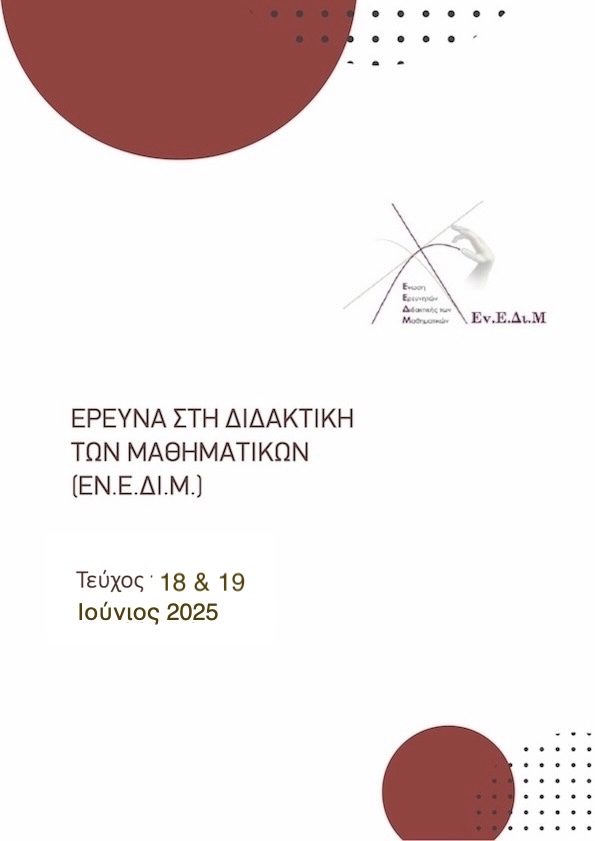ΔΡΑΣΤΗΡΙΟΤΗΤΕΣ ΑΝΟΙΧΤΗΣ ΑΠΑΝΤΗΣΗΣ ΚΑΙ ΔΗΜΙΟΥΡΓΙΚΟΤΗΤΑ ΣΤΑ ΜΑΘΗΜΑΤΙΚΑ: ΑΠΟ ΤΙΣ ΑΝΤΙΛΗΨΕΙΣ ΤΩΝ ΕΚΠΑΙΔΕΥΤΙΚΩΝ ΣΤΗ ΣΧΟΛΙΚΗ ΠΡΑΓΜΑΤΙΚΟΤΗΤΑ
Resumen
Η δημιουργικότητα των μαθητών στα μαθηματικά μπορεί να ενισχυθεί μέσω της αναζήτησης πολλών λύσεων σε δραστηριότητες ανοιχτής απάντησης. Ωστόσο, έχει φανεί ότι οι εκπαιδευτικοί συχνά αγνοούν ή δεν αξιοποιούν κατάλληλα τέτοιες δραστηριότητες. Η παρούσα εργασία εστιάζει σε επτά εν ενεργεία εκπαιδευτικούς πρωτοβάθμιας εκπαίδευσης και εξετάζει κατά πόσον συνδέουν τις δραστηριότητες ανοιχτής απάντησης με την καλλιέργεια της δημιουργικότητας καθώς και τον βαθμό στον οποίο τις αξιοποιούν στη σχολική τάξη. Πραγματοποιήθηκαν συνεντεύξεις με τους εκπαιδευτικούς και παρατήρηση της διδασκαλίας τους, πριν από και μετά τη συμμετοχή τους σε επιμορφωτική παρέμβαση, εστιασμένη στην καλλιέργεια της μαθηματικής δημιουργικότητας. Τα αποτελέσματα αναδεικνύουν την περιορισμένη παρουσία δραστηριοτήτων ανοιχτής απάντησης στη σχολική τάξη και την ασυνέπεια μεταξύ των αντιλήψεων των εκπαιδευτικών και των διδακτικών πρακτικών τους.
Article Details
- Cómo citar
-
Ζιώγα Μ., & Δεσλή Δ. (2025). ΔΡΑΣΤΗΡΙΟΤΗΤΕΣ ΑΝΟΙΧΤΗΣ ΑΠΑΝΤΗΣΗΣ ΚΑΙ ΔΗΜΙΟΥΡΓΙΚΟΤΗΤΑ ΣΤΑ ΜΑΘΗΜΑΤΙΚΑ: ΑΠΟ ΤΙΣ ΑΝΤΙΛΗΨΕΙΣ ΤΩΝ ΕΚΠΑΙΔΕΥΤΙΚΩΝ ΣΤΗ ΣΧΟΛΙΚΗ ΠΡΑΓΜΑΤΙΚΟΤΗΤΑ. Έρευνα στη Διδακτική των Μαθηματικών, (18 & 19), 7–25. Recuperado a partir de https://ejournals.epublishing.ekt.gr/index.php/enedim/article/view/39522
- Sección
- Άρθρα

Esta obra está bajo una licencia internacional Creative Commons Atribución 4.0.
Οι συγγραφείς των άρθρων που δημοσιεύονται στο περιοδικό διατηρούν τα δικαιώματα πνευματικής ιδιοκτησίας επί των άρθρων τους, δίνοντας στο περιοδικό το δικαίωμα της πρώτης δημοσίευσης. Άρθρα που δημοσιεύονται στο περιοδικό διατίθενται με άδεια Creative Commons BY και σύμφωνα με την άδεια μπορούν να χρησιμοποιούνται ελεύθερα, με αναφορά στο/στη συγγραφέα και στην πρώτη δημοσίευση.


